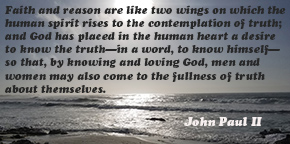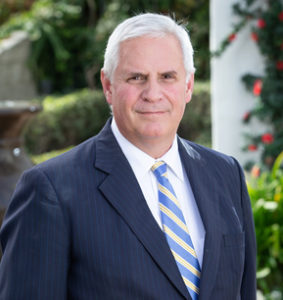Abraham’s Reward
I never thought I’d have a big family. I certainly wasn’t opposed to it. It just wasn’t in my imagination. There were three of us in our family growing up and my mother, who very much wanted a big family, sadly, was deprived of it for health reasons that resulted in a hysterectomy that grieves her to this day.
But I didn’t need any imagination to guide me in what to do. I was thankful for my faith and realized that the size of our family was in God’s domain, not mine. And I need to be quick in talking about domains to say “ours,” not “mine,” as my dear wife, Cari, was every bit as committed to a faithful life as I could ever hope to be.
Obviously, having that joint commitment is something I take for granted and that others may not happily enjoy. But that was one of the things that attracted us in the first place – that we would put God first in our lives and let everything else follow. That didn’t mean we threw caution to the wind and just leapt off cliffs, as it were, waiting for Him to catch us. We wanted to be sensible, practical, too.
Just before our wedding, we found that sensibility tested directly. In early June, two months before our August wedding, I found out that the job I had been guaranteed in September evaporated. Law firms can be fickle business ventures, often splitting, reforming, dissolving on a moment’s notice. The moment happened for me three weeks after graduation from law school, on the last day of my clerkship in June before I left to study for the July bar, and while Cari was occupied with all the usual wedding plans of any nervous bride-to-be.
“What, no job?,” she said. Well, sorta. The splitting partners wanted me to join them, but couldn’t promise me any income. I’d be left to my wiles and I really didn’t have any wiles. Gulp. “What if I get pregnant right away?,” she intoned. “And what if it’s a complicated one and I can’t work?” Yeah, that would be problem. She had a full-time job and would be our full-time breadwinner. But she wouldn’t be able to win bread if these contingencies occurred.
Practically speaking, we were prepared. Our engagement preparation, at a wonderfully faithful Catholic parish, included a mandatory Natural Family Planning course that got her tracking and charting and understanding how to work with fertility. With this news upon us, she now started tracking and charting in earnest.
We married in August, started working in September, and found over the next year that, as I feared, I really didn’t have any wiles to sustain us in the new job. The experience was great, as were the splitting partners, but thanks to Cari, she put bread on the table. And, thanks to the NFP course, we suppose, she was able to keep the bread on the table.
The following year, an opportunity arose for me to work in Washington, D.C., and with it a paying job that eliminated our fears over job-ending pregnancies. And within a few months, and still using NFP charting and tracking to identify high fertility times, thanks be to God, Cari got pregnant and then gave birth to our first child, dear baby Rebecca.
Second-Guessing
So far, this sounds like a perfectly orchestrated story. But I have to say it comes with some amount of second-guessing in hindsight. Looking back now over 37 years, I must confess (introspectively, not sacramentally) that we wonder if we should have been doing the orchestration after all. I mean, really, the Lord of the Earth and Sky who lets sparrows fall only on His command – we can’t trust Him to take care of us, knowing our special predicament and our special needs, to put bread on our table, pregnancy (or problem pregnancy) or not? I cringe at the words “O, ye, of little faith.”
That’s always a hard line that presents us with hard choices, and I don’t want to second-guess other people’s choices either. But there’s nothing necessarily wrong in me second-guessing my own choices, especially if others might profit from that second-guessing.
I mentioned at the outset that we shouldn’t want to leap off cliffs and let God catch us. That’s certainly true. Being “Stupid for Christ,” as some intrepid faithful like to claim they should be, is still being Stupid.
We should never be stupid. God gave us brains to avoid being stupid. And our faith is not stupid, either. It’s firmly grounded in reason which is the other of the two indispensable wings by which we fly, as St. John Paul II liked to put it.
But I keep coming back to a talk I once heard many years ago by Kimberly Hahn, wife of the famed Catholic apologist, Scott Hahn. Kimberly was recounting her own conversion experience to Catholicism, which came through a great amount of difficulty after Scott had explained his to her. One of the points she kept reflecting on was God’s promise to Abraham for being faithful – faithful to the point of being willing to sacrifice the very son, and only son, he was given in his very old age. “I will make your descendants as numerous as the stars in the sky or the sand on the shore of the sea.”
What a reward, she thought. God promised Abraham not with wealth, power, or dominion. He rewarded him with people. People – that is, children – are a blessing; the greatest of all blessings. You are not cursed with them; you are blessed with them. God blessed Abraham with children. This was his reward for being faithful. As Kimberly thought, “Why would you ever want to have fewer blessings?”
She also thought about faith, Abraham’s faith. She said she had been thoroughly steeped in Evangelical Biblical pieties about “trusting in God in everything, in every little detail of our lives.” She noted a glaring inconsistency. “Why don’t we trust God in relation to our own fertility?” That’s certainly not a little detail. It’s a huge detail, indeed, probably the most significant detail of a couple’s married life. Oh yes, we should trust God to keep us safe, protect our jobs, cure our ills, guide our decisions, and get us favored parking spots. But we can’t trust Him in our sex lives? What the heck is with that? Why is that exempt? O, ye, of little faith.
It was thoughts like these that pushed Kimberly into the river as she swam across the Tiber. But it was thoughts like these that have made us second-guess whether we were too fearful in not just trusting our newly-married procreating activity over to God. Would it have changed the course of our lives? I don’t know. Would we have had more children? I don’t know. Probably. Would that have been worse or better for us? That’s an easier question. Of course, it would have been better, because God would have blessed us for our faithfulness. Not that we would have earned it, of course. No Pelagians here. Merely that our lives always work better when we act within His will, rather than in ours.
Who’s Counting?
As is often the case, God still blesses us in spite of our fears, even our sins. And quite undeservedly, in all cases. And so He proceeded to bless us, too. After baby Rebecca came other babies: Monica, Kathleen, Joseph, John, Michael, and Sarah. We had at least four other babies, too, but, sadly, they are not with us. Miscarriage, like any death, is something we leave to God’s mystery and mercy. We are all worth more than little sparrows.
But I have never thought of our seven kids in terms of numbers. They are people, not numbers and I have always had a hard time counting how many plates to set at table. I have to think in names, even as I pull out plates.
And I’m quick to challenge other people when they want to talk just numbers, too. In terms of kids, that is. “You have seven kids!” people sometimes gush. Well, yeah. Which of them should we not have had? I can go through each one of them, each with their unique personalities, virtues, agilities, senses of humor, impact on the world around them. I could brag at length about all of them. You pull out one, you pull out everything that comes with it. Why would you want fewer blessings?
They are now beginning to enjoy their own blessings, too. Rebecca (and Carter) have baby Dane. Monica (and Lou) have Jack, Vince, and a new baby shortly. Kathleen (and Matt) have Jacob, Damien, and Xavier. Some people call these grandchildren. That makes me sound old, so I call them “Family Babies.” The others haven’t married yet, so more may come.
But who’s counting? Abraham didn’t. He couldn’t. I won’t either. But I do ponder Abraham and his faith and about the many blessings that currently exist, those that are yet to be, and those that might have been.



